The best movies right now on Amazon Prime Video

- Oops!Something went wrong.Please try again later.
- Oops!Something went wrong.Please try again later.
- Oops!Something went wrong.Please try again later.
- Oops!Something went wrong.Please try again later.
- Oops!Something went wrong.Please try again later.
- Oops!Something went wrong.Please try again later.
- Oops!Something went wrong.Please try again later.
Amazon Prime Video has a wide selection of terrific films, from classic dramas and comedies to a new wave of declarative originals. But amid today’s hypercompetitive streaming wars, the platform has been hindered perhaps more than any other by ongoing shuffling of titles. So, what’s a movie-hungry subscriber to do? Read The A.V. Club’s recommendations for the best available films on Prime Video, that’s what.
Currently, the platform plays host to the Road House remake starring Jake Gyllenhaal. Oscar nominations abound for films distributed by Amazon Studios, like Manchester By The Sea, Cold War, and The Big Sick. And if a rewatchable comedy like The Big Lebowski or The Devil Wears Prada is what you’re in the mood for, you’re in luck. Check out our roundup of Prime Video’s best viewing options and The A.V. Club’s thoughts on each.
This list was updated on December 30, 2023.
21 Grams

A nearly unparalleled actor’s showcase, [21 Grams] boasts performances of impressive quality and quantity: Penn brings a coiled, Brando-esque intensity to a performance that eerily echoes his turn in Mystic River, but he’s equaled by the formidable Del Toro and Watts, who tear into their own meaty, challenging roles. Their complexity matches the film’s. At a time when the justice system seems intent on extracting an eye for an eye, 21 Grams suggests that the harshest punishment may be the one enacted by the consciences of the guilty. [Nathan Rabin]
An American Werewolf In London (1981)
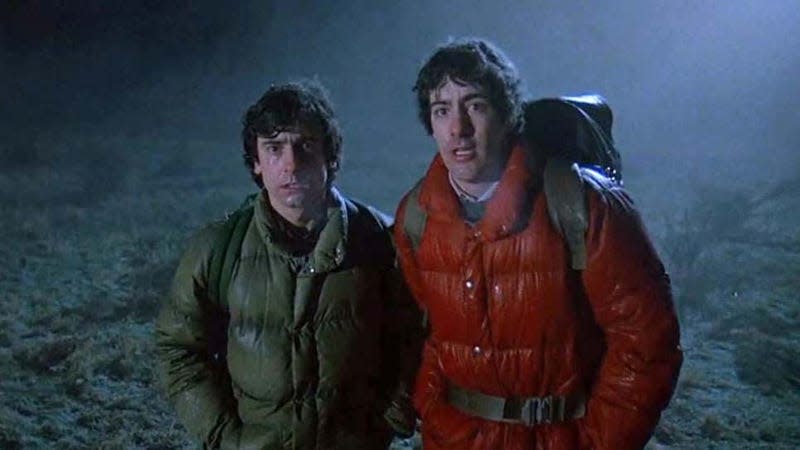
Rick Baker won the very first Best Makeup And Hairstyling Oscar for his ingenious practical effects work on An American Werewolf In London. His big showcase: the scene where a bitten American tourist becomes a creature of the night—a hilarious/horrifying set piece that required star David Naughton to undergo several different prosthetic permutations (a 10-hour-a-day ordeal), each shot progressing him into a new stage somewhere between man and wolf, while the makeup team stretched rubber torsos and limbs to capture the agonizing, bone-cracking physicality of the change. Interestingly, to do American Werewolf, Baker had to leave The Howling, that other half-comic werewolf movie from 1981. [A.A. Dowd]
Stream it now
Anything’s Possible
It’s hard to overstate the significance of a film like Anything’s Possible receiving anything akin to a mainstream release. In a time when an unprecedented wave of anti-transgender legislation is sweeping through state legislatures, stories of trans experience are vital and necessary. Though one might hope that empathetic representation might humanize trans folks in the eyes of their oppressors, the value of a story like this one is self-evident to trans teenagers and their allies who otherwise do not see their experiences portrayed on screen, much less in an age of pluralized culture where there’s plenty of room to cater to every audience. This doesn’t give Anything’s Possible a free pass in terms of quality—and there are certainly aspects of Billy Porter’s feature directorial debut that don’t quite work—but screenwriter Ximena Garcia Lecuona crafts such a sweet coming of age tale that it’s easy to celebrate the film’s plentiful merits. [Leigh Monson]
Apollo 13
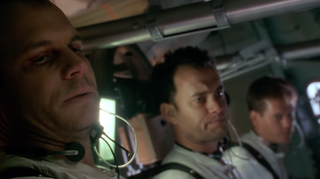
Imagine hopping into a time machine, traveling back to mid-July of 1969, stopping by NASA, and telling folks there that half a century later, there still won’t be a big-budget Hollywood movie about humanity first setting foot on the moon (only a TV miniseries, which wouldn’t sound remotely prestigious three years before HBO even launched, and a Neil Armstrong biopic), but that there will be a popular, Oscar-winning movie about the third attempt to travel there. Actually, the word “attempt” alone would likely inspire sufficient alarm to alter the course of history, saving everyone a lot of anxiety and hassle, albeit at the cost of depriving the world (or perhaps some alternate/parallel universe) of a terrific film. For while Apollo 13 was a doomed mission, Apollo 13—directed by the kid who just finished playing Opie Taylor, you inform the ’69ers, ensuring that they’ll dismiss your entire crazy story—exemplifies studio filmmaking at its finest, throwing money, talent, and craft at the problem in much the same way that NASA worked collectively to save its astronauts. [Mike D’Angelo]
The Big Lebowski
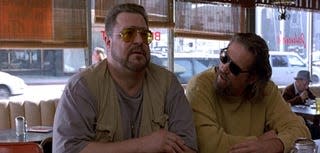
From our list of the best movies of the ’90s:
When the Coen brothers followed up their Academy Award-winning breakthrough hit Fargo (a film deemed “culturally, historically, or aesthetically significant” by no less an authority than the United States National Film Registry)with a shaggy stoner lark about the world’s most unlikely and least qualified would-be shamus (Jeff Bridges as “The Dude,” the signature role of his magnificent career) and his mock-heroic quest to retrieve a missing rug that famously held the whole room together, it felt like one of the smartass brothers’ inside jokes. The film was released to mixed reviews, modest box-office, and widespread confusion before beginning a strange journey to becoming the cult film of the ’90s, the Rocky Horror Picture Show of its time. The Big Lebowski created an entire subculture of tongue-in-cheek “achievers” who dress up like the film’s characters and attend “Lebowski Fests” where they drink white Russians, bowl, and recite favorite lines. Like Bridges’ performance, The Big Lebowski only appears effortless: The slacker facade and shaggy-dog plotting—with its surplus of red herrings, dead ends, and seemingly pointless digressions—belie the film’s underlying meticulousness and manic perfectionism. Slow-motion shots of middle-aged men bowling are choreographed and scored as artfully as anything in Stanley Kubrick’s oeuvre, in a comedy that gave pop culture one of its quintessential antiheroes and created an absurd and insanely detailed universe. Cult movies come and go, but like its hero, The Big Lebowski abides.
The Big Sick
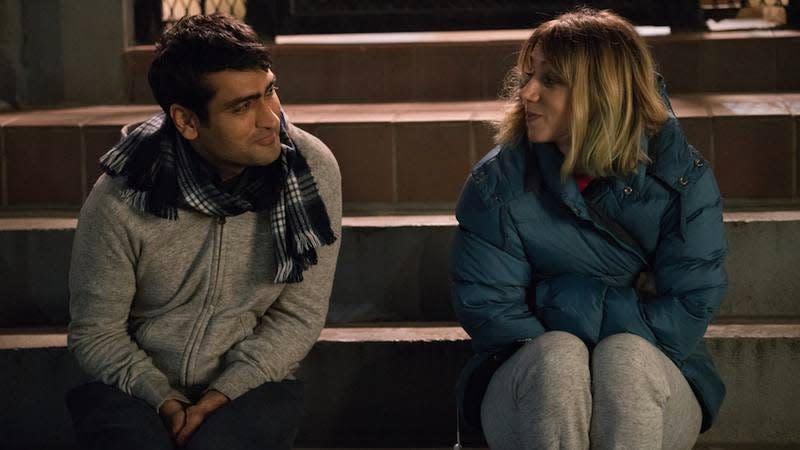
Interesting anecdotes don’t always make for interesting movies; your story may kill at parties, but that doesn’t mean it belongs on the big screen. In The Big Sick, stand-up comedian Kumail Nanjiani, who plays Dinesh on Silicon Valley, and Emily V. Gordon, the writer and former therapist he married, dramatize the rocky first year of their relationship, with Nanjiani starring as a lightly fictionalized version of himself. That may sound, in general synopsis, like a story better told over dinner and drinks; besides friends, family, and fans of the podcast the two co-host, who was clamoring for a feature-length glimpse into the couple’s courtship? But there was more than the usual dating-scene obstacles threatening their future together. Collaborating on the screenplay for The Big Sick, Nanjiani and Gordon have made a perceptive, winning romantic comedy from those obstacles, including the unforeseen emergency that provides the film its title. [A.A. Dowd]
Cold War

Cold War, from Polish writer-director Pawel Pawlikowski, is a haunted romantic epic in miniature, like a novel written with the careful, precise economy of a short story. Tracking the ups and downs of a tumultuous love affair against seismic shifts in the cultural landscape, it condenses 15 years of plot and history—spread out across four countries situated on the fault line of the 20th century—into a spare, elegant 89 minutes. That kind of ruthless streamlining can make a lesser drama feel like its own CliffsNotes, all who and what and where, no texture or poetry. But Pawlikowski, who doesn’t waste a shot (nor compose one that isn’t a work of art on its lonesome), creates a gripping present tense from the clarity and efficiency of his storytelling: No matter how often he lurches us forward in time, we remain locked into the emotional sphere of his characters. [A.A. Dowd]
Stream it now
The Devil Wears Prada
Sometimes actors get parts so rich that they almost can’t help but make meals of them. Playing a frosty, high-powered editor in The Devil Wears Prada, Meryl Streep turns the role into a four-course dinner and shows up with her own dessert. It’s an example of perfect casting paying off, with Streep bringing out her underutilized comic chops to play a beyond-demanding boss while keeping her over-the-top behavior tethered to a believable character. It’s a diva turn in a diva part. It’s tempting to applaud at the end of her scenes. [Keith Phipps]
Fight Club
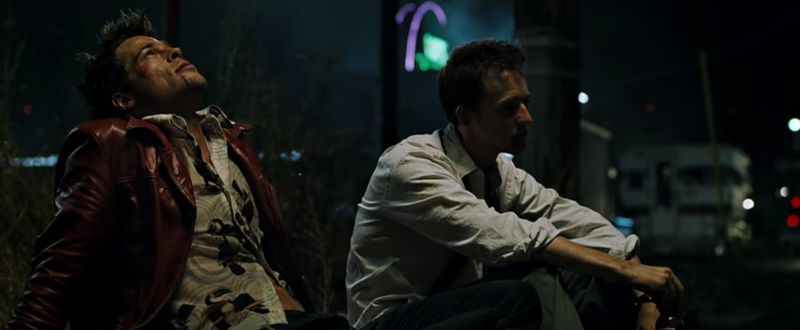
Since basically flopping at the box office, Fight Club has been widely misinterpreted as a sincere glorification of male violence. That reading misses the point of David Fincher’s adaptation of the satirical Chuck Palahniuk novel, which addresses legitimate concerns about culture commodification, cannibalistic capitalism, and increasing social isolation but ultimately argues we shouldn’t give into our darkest impulses when trying to change the world. Edward Norton’s wonderfully unhinged performance meets its match in Brad Pitt, who brings gleeful mania to Tyler Durden’s personified id. The push-pull magnetism between the pair adds emotional depth to scenes that masquerade as mere masculine posturing, and Helena Bonham Carter’s Marla Singer, with her own brand of anti-establishment survivalism, is the film’s secret weapon. Those performances, combined with the Dust Brothers’ trippy score and Fincher’s customarily confident visual flair (bringing the IKEA catalog to life with the rhythmic population of Norton’s apartment, for example), cemented Fight Club as a cult classic to be feverishly consumed (and misunderstood) for years to come. [Roxana Hadadi]
Galaxy Quest
An inspired spoof of and tribute to Star Trek, Galaxy Quest stars Tim Allen as the one-time star of the long-canceled, cultishly adored science-fiction show of the title, the captain of a fictional starship whose crew now finds its steadiest employment signing autographs at conventions and opening discount electronics stores. When guileless space aliens who believe the series’ episodes to be “historical documents” (imagine hardened Trekkies with an even looser grasp on reality) kidnap Allen and his crew, the group is forced to recall the lessons of its fictional past and band together to save the aliens’ fragile civilization, which is founded on the high-minded if occasionally illogical principles of the series. Director Dean Parisot (Home Fries) makes the most of Robert Gordon and David Howard’s Three Amigos-in-space screenplay, never letting the impressive special effects get in the way of a solid comedy that would have worked at half the budget. [Keith Phipps]
Girl With A Pearl Earring
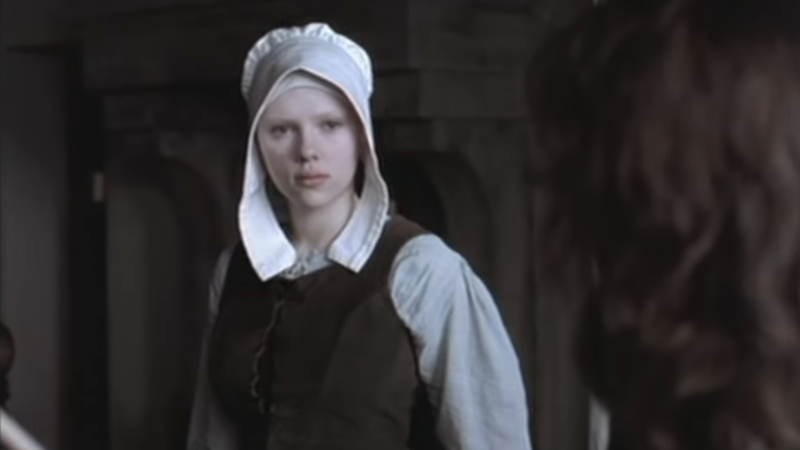
Adapting Tracy Chevalier’s novel, Girl With A Pearl Earring seeks not so much to clear up the mysteries Johannes Vermeer’s painting as to capture more moments of pregnant ambiguity where lives find their potential, and to show the unspoken codes that keep that potential in check. As the film opens, its eponymous heroine, beautifully played by Scarlett Johansson, seems incapable of her immortal expression, or even of looking anyone else in the eye. A Protestant among Catholics, a woman in a man’s world, and a new servant in the established ranks of the busy, precariously prosperous Vermeer household, she keeps her hair covered and her head low. It takes time for her to develop any relationship at all with Vermeer (Colin Firth), and more time still for that relationship to blossom into something between infatuation and mutual admiration. When it does, Firth is struck by her beauty, but also by her instinct for color and composition, which has no outlet other than helping him. Making the transition from British television, director Peter Webber displays a great sense of understatement and a keen eye for careful framing, with cinematographer Eduardo Serra beautifully re-creating Vermeer’s signature play of shadow and light. Within Pearl Earring’s brisk running time, Webber sketches out the boundaries that money and tradition place around his characters’ lives, and shows how far their dreams overshoot those boundaries. Conveying a wicked sense of entitlement, Tom Wilkinson plays Firth’s patron as a man fully aware of the bottomless pit over which he dangles painter and subject alike, and equally aware that he need never speak of his power. Only the usually reliable Firth seems somewhat off, too much a brooding artist and too little a man. Yet this ends up working in the film’s favor, keeping the mystery of Vermeer intact until a final, offscreen gesture gives his most famous model a melancholy dignity to match the shroud of immortality. [Keith Phipps]
The Handmaiden
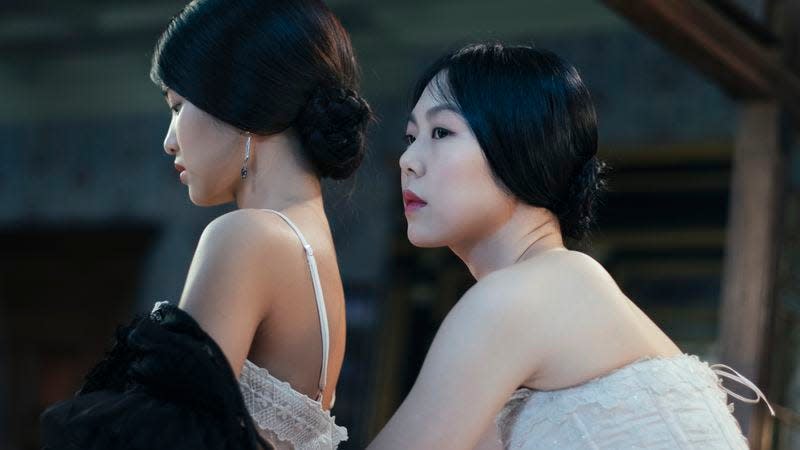
Park Chan-Wook achieves the rank of cinema master with The Handmaiden, which transports Fingersmith, Sarah Waters’ novel of hidden identities and lesbian passion, to 1930s South Korea, adding plenty of Hitchcockian suspense in the process. Sumptuously shot with a fetishistic formality that recalls last year’s The Duke Of Burgundy, Park creates a sensual experience as lush as biting into an overripe peach and as kinky as a pair of leather gloves gently stroking the back of your neck. Kim Tae-ri stars as Sook-hee, a young pickpocket who is hired to work for seemingly sheltered Japanese noblewoman Lady Hideko (Kim Min-hee); the plan is for Sook-hee to help fellow con artist Count Fujiwara (Ha Jung-woo)—who is, in reality, neither a count nor Japanese—defraud Lady Hideko of her fortune. But as their love triangle grows increasingly complicated, it becomes clear that Lady Hideko is not as naive as she seems. Outstanding performances from the female leads carry the film through its dizzying twists and turns, underlaid with a wicked streak of black comedy and an unexpected faith in the power of true love. [Katie Rife]
Herself
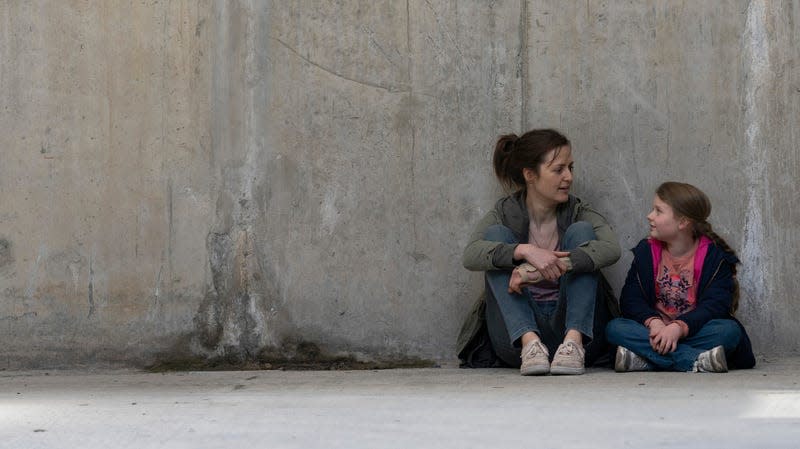
Domestic violence extends, for many, far beyond the physical and into a brutal system not built with the survivor in mind. To leave an abusive household is an uphill battle in many advanced societies, where the courts and laws can put victims at a heavy disadvantage. Directed by Phyllida Lloyd (The Iron Lady), from a script by Malcom Campbell and star Clare Dunne, Herself approaches the subject gracefully, and with an unexpected degree of hope. In an era when neighbors often turn on neighbors, the film’s optimistic “It takes a village” perspective risks hokeyness. But thanks to Dunne’s quietly powerful performance as a single mother barely treading water, the end result is an effective, affecting look at community triumphing over fear. [Anya Stanley]
High-Rise
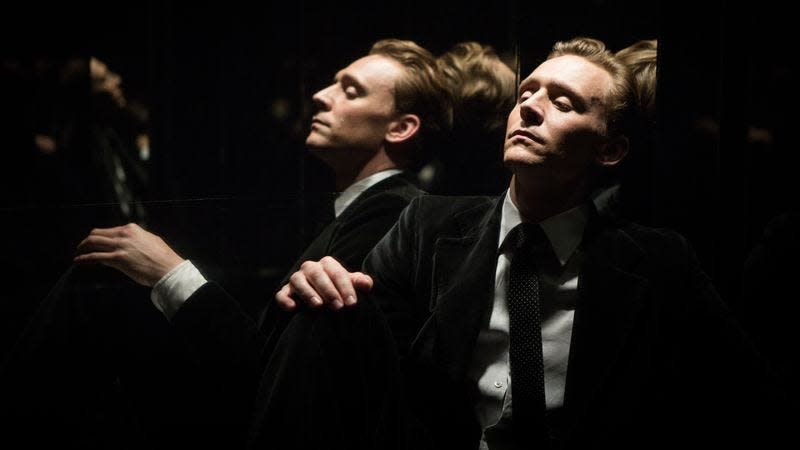
High-Rise, a darkly funny adaptation by cult English director Ben Wheatley (Kill List, A Field In England) of the J.G. Ballard novel of the same title, preserves the book’s ’70s setting, steeping its vision of a toppling society in retro decadence. Dr. Laing (Tom Hiddleston, very good), a bachelor physiologist from apartment 2505, watches as the titular building regresses into a Mad Max-esque wasteland of garbage barricades, raiding parties, and literal class warfare following a few blackouts and a problem with the trash chute—a descent into collective madness that High-Rise underplays and elides to surreal (and audience-defying) effect. Wheatley’s use of ellipses and his overall refusal to do anything that might suggest a point of view or invite identification skirt incoherence. As in Ballard’s novel, the building isn’t just a dystopian microcosm of alienation and stratification, with the wealthiest living at the top. It also seems to create a new reality of its own: a killer cocktail of claustrophobia, stylishness, and oblique irony. [Ignatiy Vishnevetsky]
Honey Boy

Welcoming back a celebrity whose fallen out of public approval can seem like the amnesiac outcome of icky PR stunts, especially when the person in question has done legitimately foul things. Yet Honey Boy feels far from a manufactured apology tour. Shia Labeouf, as actor and writer, bares his soul in unexpectedly compelling ways, reckoning with the ugly parts of himself while confronting, with remarkable lucidity, the traumas that have come to define him. [Beatrice Loayza]
How To Train Your Dragon

When you’re a Viking—or at least a Viking in the world of How To Train Your Dragon—you know one thing for sure: Dragons are the enemy. They steal sheep. They burn down houses. And given the chance, they’ll swallow a Viking whole. That’s just the way of the world. But it isn’t a way into which Hiccup, the film’s teenage protagonist (voiced by Jay Baruchel), fits particularly well. He’s eager to prove himself, but he’s kind of a wimp and everyone knows it, from his chieftain dad (Gerard Butler) to Astrid (America Ferrera), the tough chick with a grip on his heart. He lucks into downing a dragon by tangling it in a catapulted snare, but when he goes to claim his prize, Hiccup discovers he can’t bring himself to slay the beast. So he sets about befriending it instead. [Keith Phipps]
I Am Not Your Negro
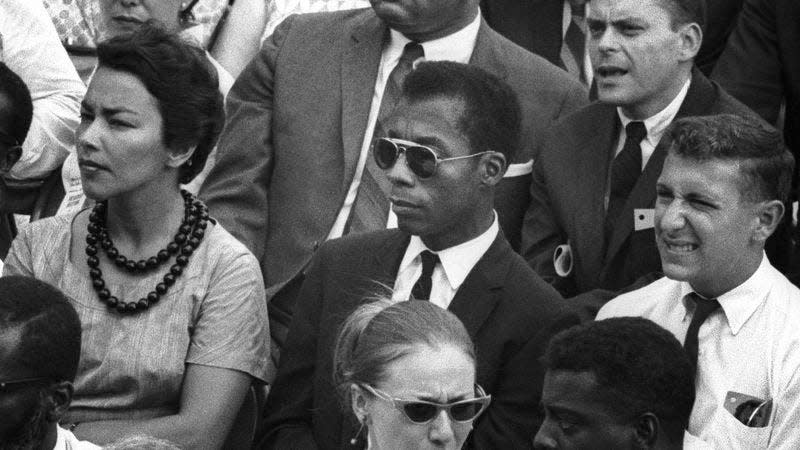
Raoul Peck’s docu-essay I Am Not Your Negro is narrated by Samuel L. Jackson, speaking in a voice so low and affected that he hardly sounds like himself. He doesn’t quite sound like James Baldwin either—or at least not like the mellifluous, twangy Baldwin seen in the old clips from talk shows and public affairs programs scattered throughout Peck’s film. Jackson sounds more like the author late at night, exhausted, half-whispering bitter truths into a tape recorder. I Am Not Your Negro could be considered one of the final statements from a great American writer, and it’s a sadly resigned one, summarizing centuries of overt and subtle racism and expressing a feeling of hopelessness. To say that this movie is as relevant now as it was when Baldwin was alive is no great analytical leap. The trends of these times would not have surprised the man himself. As repeated throughout Peck’s film, Baldwin never had much faith that black people could ever live in a United States where they’d wake up in the morning without at least some worry that they’d be shot dead by nightfall. [Noel Murray]
Licorice Pizza
Licorice Pizza is a woozy time-warp shuffle of a comedy: a California daydream of infatuation, aspiration, and protracted adolescence that seems to propel its celebrated writer-director, Paul Thomas Anderson, forward and backward at once. The film is set in the San Fernando Valley of the early 1970s, returning its maker to the time and place that made him, and also roughly to the same setting as his sprawling ensemble period pieces Boogie Nights and Inherent Vice. Yet if Licorice Pizza can be called a homecoming, it also paves new ground for the great American artist who plucked it from his memories and dreams: For better or worse, and especially on the heels of the refined, meticulous Phantom Thread, this looks like the shaggiest and most rambling movie of Anderson’s esteemed, ever-evolving career. [A.A. Dowd]
The Little Hours
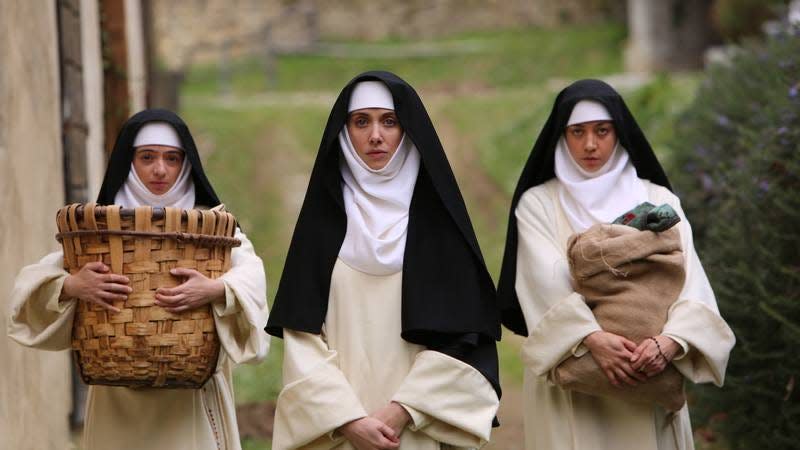
One of the first things Aubrey Plaza says in The Little Hours is “Don’t fucking talk to us.” Anachronism, as it turns out, is the guiding force of this frequently funny, agreeably bawdy farce, which imagines what a convent of the grubby, violent, disease-infested Middle Ages might look and sound like if it were populated by characters straight out of a modern NBC sitcom. Plaza’s Fernanda, a caustic eye-rolling hipster nun born eons too early, sneaks out to get into mischief, using a perpetually escaping donkey as her excuse. Uptight wallflower Genevra (a priceless Kate Micucci) tattles relentlessly on the other women, reporting every transgression to Sister Marea (Molly Shannon, playing her dutiful piousness almost totally straight—she’s the only character here that could actually exist in the 1300s). And Alessandra (Alison Brie), the closest the convent has to a spoiled rich kid, daydreams about being whisked away and married, but that would depend on her father shelling out for a decent dowry. If the plague doesn’t kill them, the boredom will. When Plaza, Micucci, and Brie get smashed on stolen communion wine and perform a drunken sing-along of a wordless choral staple, like college girls sneaking booze past the RA and belting some radio anthem in their dorm, the true resonance of all this anachronism slips into focus: An itchy desire for a better life is something women of every century experience, regardless if their catalog of curses yet includes “fuck.” [A.A. Dowd]
Long Strange Trip
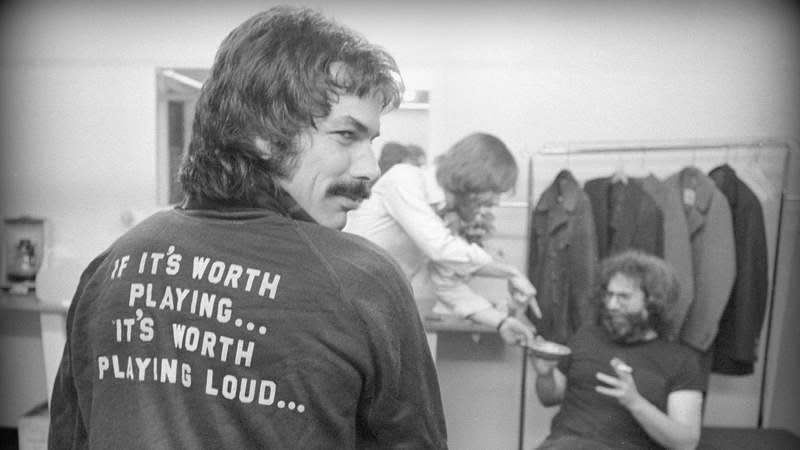
The rare rock documentary that appeals to hardcore fans and also functions as a full, satisfying movie, Amir Bar-Lev’s Long Strange Trip tells the story of the Grateful Dead in an appropriately winding way, taking four hours to riff on different aspects of the band. For those who want to know how and why guitarist Jerry Garcia and his mates emerged from the mid-’60s San Francisco hippie scene to become global cult sensations, that basic info is here. For connoisseurs who want rare live footage and intimate personal anecdotes, Long Strange Trip offers plenty of both. But the main reason why this film will endure is that Bar-Lev (best-known for My Kid Could Paint That, Happy Valley, and The Tillman Story) uses the best and worst moments from Garcia and company’s story to explore how myths are made, and then misinterpreted. [Noel Murray]
The Lord Of The Rings: The Fellowship Of The Ring
In condensing Tolkien’s book to feature length, Jackson and his screenwriters do the necessary pruning while still remaining faithful to the text. Pared down to its Cliffs Notes essence, the story moves forward at a relentless pace, occasionally sacrificing ambience for speed. But only the most expansive imagination could dream up a spectacle of such eye-popping proportions, with Jackson and his technicians constructing kingdoms and monsters with the innovation and joy of top-flight Ray Harryhausens. Setting vast digital armies against towering backdrops, the battle sequences have the visceral kick expected from the director of Dead Alive, as Wood and his motley militia hack through foes like zombies at the business end of a lawnmower. The Fellowship Of The Ring ends with a cliffhanger, but unlike the first Harry Potter movie, its rote annual competitor, it should leave viewers anxious to know what happens next. [Scott Tobias]
The Lord Of The Rings: The Two Towers
To live up to expectations, The Two Towers only had to be as good as its predecessor–and, astoundingly, it’s better. That’s not simply a matter of exposition giving way to action, although the film has plenty, as soulful hobbits Elijah Wood and Sean Astin make their way toward Mordor, friends Billy Boyd and Dominic Monaghan find unlikely allies deep in a forest, and the dwarf/elf/human team of John Rhys-Davies, Orlando Bloom, and Viggo Mortensen attempts to defend a struggling kingdom from the forces of Christopher Lee. What makes Towers so staggering is the way it brings the full scope of Jackson’s adaptation into focus. Without missing a beat in three hours, the film shifts from epic to lyrical and back. It portrays a harrowingly intense battle one moment, then pauses for a father’s grief over his son’s death the next. It shows in frightening detail the engines of war, then links those engines to the bloodshed they exact and the ecological destruction that made them possible. What Fellowship suggested, Towers elucidates. It’s thrilling as swords clash and arrows fly, but it also never abandons the underlying sadness of Tolkien’s world, in which each victory only forestalls the transition to a meaner age. (And, for all the attendant technophobia, it’s another technical masterpiece. Gollum, voiced by Andy Serkis, may qualify as the first fully fleshed-out performance by a CGI effect.) [Keith Phipps]
The Lord Of The Rings: The Return Of The King
The Fellowship Of The Ring proved that Peter Jackson and his co-screenwriters, Fran Walsh and Philippa Boyens, were more than capable of bringing Tolkien to the screen with an eye toward large-scale spectacle as well as a respect for the original story, characters, and themes. The Two Towers did it one better. Ratcheting up the intensity on every level, it took the series to the same place as Tolkien’s books: the realm of shared cultural myth. Jackson doesn’t buckle under the burden of winding it down with The Return Of The King, either; in fact, he lets the weightiness define the film. As Frodo (Elijah Wood), Sam (Sean Astin), and the treacherous Gollum (a CGI Andy Serkis) progress toward destroying the ring, while Aragorn (Viggo Mortensen), Gandalf (Ian McKellen), and the Fellowship’s other surviving members mount a defense against the evil Sauron, every gesture conveys a significance emphasized by Jackson’s slow, portentous approach. In the end, the director pays off the time viewers invested in the first two films with a climax that places equal emphasis on both Wood’s personal struggle and an army-of-millions battle, with a denouement that gives a proper sendoff to characters who have become something like old friends. [Keith Phipps]
Love & Friendship
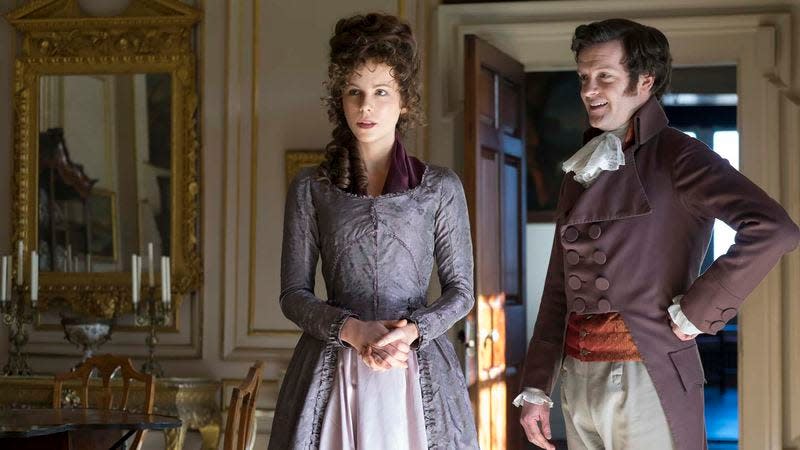
Whit Stillman adapting Jane Austen feels at once apt and almost unnecessary. His previous films—obsessed as they are with manners, social status, and conversational diplomacy—come pretty close to fulfilling any need we might have for a modern-day Austen. Metropolitan’s characters even discuss Austen at length, arguing passionately about Mansfield Park’s virtuous heroine and her relevance to contemporary readers. Some cinephiles may still feel exhausted, too, by the deluge of Austen adaptations that hit TV and multiplexes during the mid-’90s: BBC’s six-part Pride And Prejudice, Ang Lee’s Sense And Sensibility, Roger Michell’s Persuasion, the Gwyneth Paltrow Emma. (These all aired or were theatrically released within a 16-month period, believe it or not.) Still, it’s not as if movies today offer such a surfeit of wit and sophistication that one as purely pleasurable as Stillman’s Love & Friendship can be dismissed. If nothing else, it gives Kate Beckinsale, who previously starred in Stillman’s The Last Days Of Disco, a lead role that isn’t a vampire, and doesn’t require her to battle werewolves while clad in black-rubber fetish gear. [Mike D’Angelo]
Manchester By The Sea
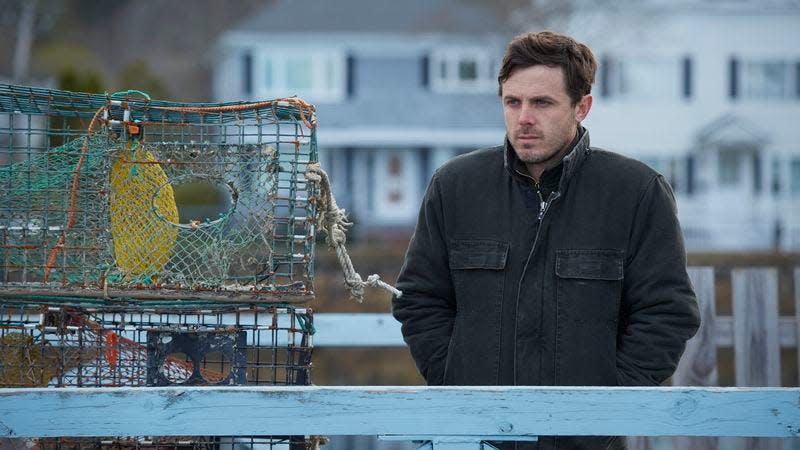
Manchester By The Sea sweats the big stuff and the small stuff, and that’s key to its anomalous power: This is a staggering American drama, almost operatic in the heartbreak it chronicles, that’s also attuned to everyday headaches, like forgetting where the car is parked and hitting your noggin on the freezer door. Director Kenneth Lonergan has had troubles of his own; his last movie, Margaret, suffered a litany of setbacks, disappearing into the editing room for years. Getting another tough, complicated character study off the ground after the well-publicized difficulties of that one is an accomplishment in and of itself. But for his third feature, the playwright-turned-filmmaker hasn’t retreated from Margaret’s messy ambition. Instead he’s managed, somehow, to wed it to the emotional intimacy of his acclaimed debut, You Can Count On Me. The results are almost unspeakably moving—and, at times, disarmingly funny. [A.A. Dowd]
Minority Report
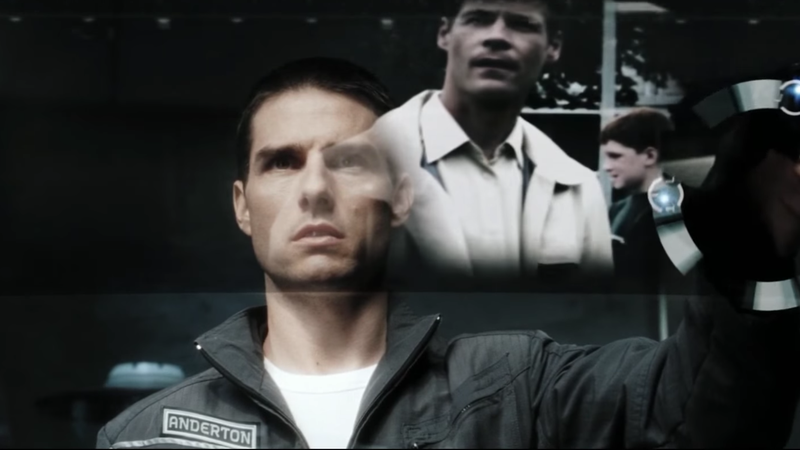
“What keeps us safe, keeps us free,” declares a propagandistic advertisement for the controversial Pre-Crime Division of the Washington D.C. police force, a unit that uses three visionary “Precogs” (short for “precognizant”) to apprehend would-be killers before they kill. The inherent contradiction of the “safety is freedom” proverb seems as lost on the leaders of 2002 as it does on the ones in 2054, which is only part of what gives Steven Spielberg’s astonishing Minority Report such enormous relevance and power. Expanding on a Philip K. Dick short story, the film could be the mirror image of Kubrick’s A Clockwork Orange, only instead of violent crime being deterred after the fact, the perpetrators are arrested before it happens. Free will is lost in both cases, but the certainty is enough for Tom Cruise, a “future crimes” detective who synthesizes the visions of three Precogs like he’s conducting a virtual orchestra. Few directors are capable of marrying ideas and entertainment—one is often sacrificed for the other—but Spielberg peppers one gripping action setpiece after another with trenchant details about a near-future robbed of the most basic freedoms and privacy. [Scott Tobias]
One Child Nation

In 1979, China launched its one-child policy, which legally prohibited most parents from having more than a single child. A drastic attempt to curb the nation’s urgent population crisis, it would go on to shape an entire generation. The repercussions of the program—still being felt today, both in China and internationally—are the subject of One Child Nation, which won the U.S. Documentary Grand Jury Prize at Sundance. As wide-ranging in scope as it is horrifying in its particulars, the film does the necessary work of illuminating, for a large audience, a dark chapter of Chinese history. [Lawrence Garcia]
One Night In Miami...
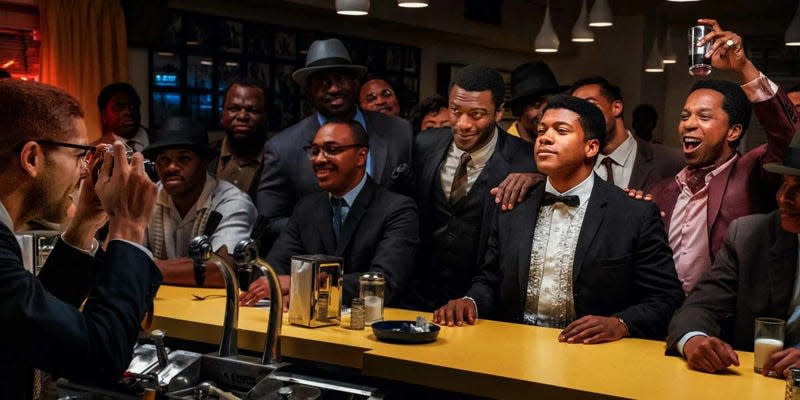
Based on a play by Star Trek: Discovery staff writer Kemp Powers, who adapted the story for the screen, One Night In Miami... mostly takes place in a single location: a segregated Hampton House motor lodge. First-time feature director Regina King adds subtle touches (she’s especially fond of pulling focus) that keep the film from going visually flat, as does the assiduous period detail. But as one might expect from a movie based on a play and directed by a famous actor, dialogue and performances are the driving force. The casting is remarkable: Everyone looks close but not too close to the famous figures they’re playing, which allows the audience to get caught up in the verisimilitude of the story without being distracted by the eeriness of the resemblance. The title card doesn’t appear until 19 minutes in, after each of the four main characters appear in a vignette that lays out the underlying tensions they’ll bring to the extended conversation at the center of the film. (For Brown, it’s the cognitive dissonance of racist whites cheering for him on the football field but only on the football field. For Clay, it’s the stubborn need to prove himself.) As a result of this extended prologue, the cast is huge: Most of the supporting roles, like Lance Reddick as X’s bodyguard, Brother Kareem, and Michael Imperioli as Clay’s trainer, Angelo Dundee, have a relatively small amount of screen time. But there are no weak links in King’s ensemble. [Katie Rife]
The Outfit
In the opening moments of The Outfit, director Graham Moore’s modestly pitched and handsomely attired gangster saga, ex-Savile Row tailor Leonard Burling (Mark Rylance) declares that creating a proper men’s suit requires taking measure of a man’s character as well as his body. “Who would this man like to be and who is he underneath?” Leonard wonders. These are important questions to ask if he’s going to survive an increasingly bloody couple of days holed up in his tailor shop where long-buried secrets and deftly hidden weapons will become as indispensable as needles and thread. Filled with twists and reversals that, for the most part, are motivated by character not plot, The Outfit is a nifty little period thriller that provides a showcase role for the always-amazing Mark Rylance. [Mark Keizer]
Peterloo
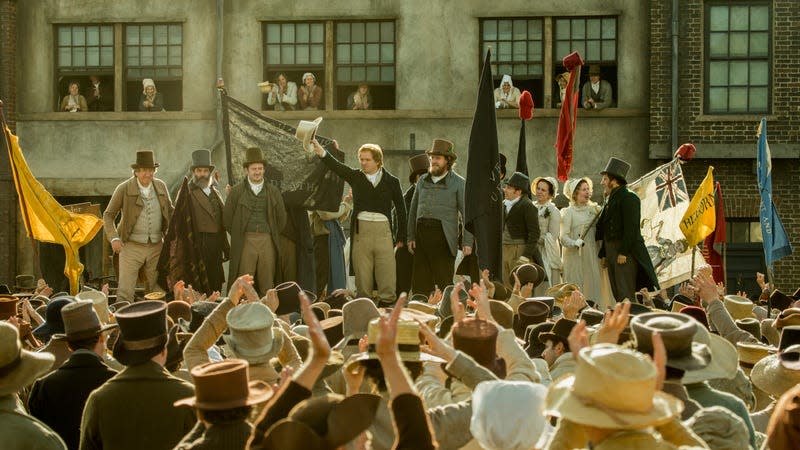
Mike Leigh’s sprawling dramatization of the events leading up to the 1819 Peterloo massacre features a colorful big band of working-class revolutionaries and government cronies. Rather than focus on a single character, Leigh takes a somewhat experimental route, narrowing his attention to the varying textures of speech within the collective to ultimately show how the relationship between rhetoric and action is fraught with misapprehension. The script is a goldmine of delectable language, from the motley Manchester dialect of the peasantry to the ornate, bloviating speech of the aristocracy. It’s politics rendered poetic. [Beatrice Loayza]
Road House
Gyllenhaal takes on Patrick Swayze’s role in this remake of the 1989 crowd pleaser. He’s Dalton, an ex-UFC fighter who takes a job as a bouncer at a roadhouse in the Florida Keys. The owner, Frankie (Jessica Williams), is trying to stop a cadre of bad guys (Billy Magnussen, Joaquim de Almeida, Arturo Castro, and Conor McGregor among them) from destroying her property for nefarious reasons that are not immediately apparent. In this small town, Dalton befriends locals (Hannah Lanier and Kevin Carroll), teaches a young bartender (Lukas Cage) how to fight back, romances a doctor (Daniela Melchior), and beats up bad guys left and right. [Murtada Elfadl]
The Report
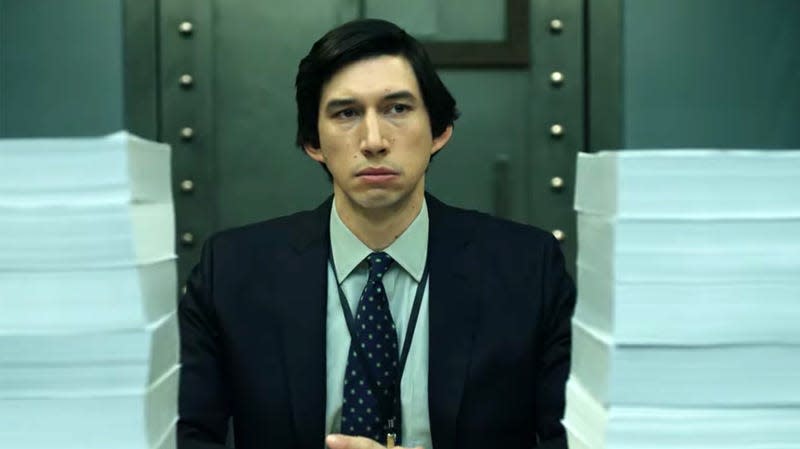
Scott Z. Burns’ look at an Obama-era investigation into the Bush-era CIA torture program captures a sentiment that feels more timely now than ever: the stunned disbelief that somehow even detailed documentation of incompetent, illegal government action isn’t enough to get anyone to do anything about it. Adam Driver may deliver a showier performance in Marriage Story, but the sense of internalized frustration he conveys in The Report is every bit as compelling. [Caroline Siede]
Saint Maud
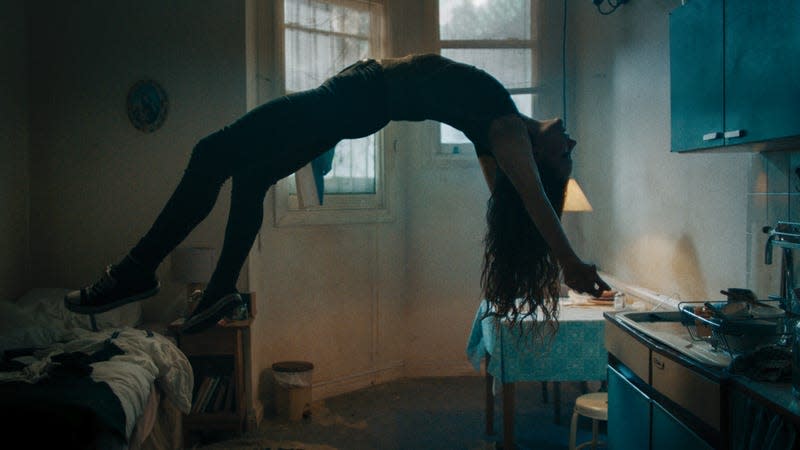
The new converts are usually the most intense. Even those raised in an evangelical environment complete with speaking in tongues and creationist puppet shows (à la the subjects of the infamous Jesus Camp) can’t compete with the flinty fervor of an ex-addict who’s found God. Some even replace old vices with religion, in a kind of one-to-one swap of self-destructive obsession. Such is the case with the title character of writer-director Rose Glass’ first feature. Maud (Morfydd Clark), a home nurse with a troubled past, depends on her regular fix of communion with the divine in order to stay on her newfound righteous path. And when she doesn’t get it? Well, you’ll see. Saint Maud’s combination of talky chamber drama, Paul Schrader-esque character study, and visceral body horror is an ideal fit for A24. In fact, the film contains a scene that’s in direct conversation with an oft-quoted sequence from one of the distributor’s early “elevated” horror triumphs, The Witch. And if there’s no taste of butter for Saint Maud, that’s because her supernatural visitor is the Old Testament type of angel, the kind that inspires both transcendent awe and bone-shaking fear. [Katie Rife]
Stream it now
Saltburn
Along the same lines as her previous picture, Fennell puts her keen eye for visual flourish to brilliant use. Rather than utilizing a widescreen format, she harnesses the claustrophobia of a tight Academy aspect ratio for extra oomph. Yet the spacious outdoors, sprawling castle interiors, and stifled secrets contained within those walls all photograph as tactile and expansive. She places characters in power positions in the frame to connote emotion and capture their psyches. It’s interesting to note where the pair of pals are placed on equal footing in the frame (which happens twice) and where they’re blocked otherwise. Inverted images of Oliver are perhaps the most aesthetically striking. [Courtney Howard]
The Silence Of The Lambs
After scaring the wits out of millions, Jonathan Demme’s The Silence Of The Lambs joined It Happened One Night and One Flew Over The Cuckoo’s Nest as one of the few movies to score Oscars in all five major categories (Picture, Actor, Actress, Director, Screenplay). Thereafter, the serial-killer movie became its own subgenre. And yet, with the possible exception of Seven, these movies—and Thomas Harris’ subsequent novels and adaptations, for that matter—invariably ripped off all the wrong things, focusing less on psychology than on the grisly details of killers’ artifacts and obsessions. Hiring Demme, surely among the warmest and most humane American directors, to handle such a violent story turned out to be a masterstroke of casting against type: He knew from his early years working for Roger Corman how to deliver the genre goods, but his empathy, particularly with regard to women, is what makes the film so enduring. [Scott Tobias]
Suspiria
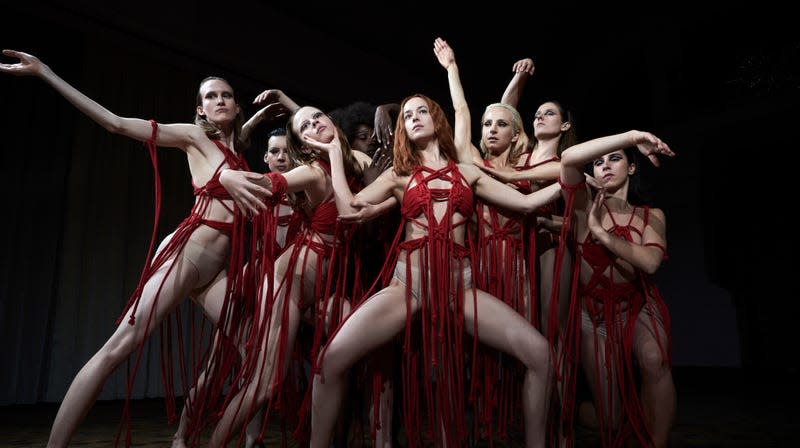
Dario Argento’s horror masterpiece Suspiria (1977) is beautiful to look at, but calling it an art film is a distinctly revisionist impulse. Although the heightened aesthetics and hysterical melodrama of Italian opera have undoubtedly influenced Argento’s style, he also overlays those high-art impulses onto B-movie genre forms. Shot mostly without sync sound and dubbed for both its Italian and American releases, Suspiria wasn’t intended to be a museum piece. In fact, take away the delirious beauty of the color-coded lighting and surging prog-rock score, and you’ve got a simple slasher movie, a film whose “witches at a ballet school” mythology is a mere delivery device for the real attraction: the violent, symbolic violation of young female bodies. Not so with A Bigger Splash and Call Me By Your Name director Luca Guadagnino’s new remake of Suspiria, a film that replaces Argento’s fixation on sexualized violence with arthouse ostentation. In his version, Guadagnino doubles down on the commitment to aesthetics that has given Argento’s original such staying power, but draws from a wholly new set of influences: Soviet-era Eastern Bloc architecture, folk-art collage, ’70s feminist performance art, the films of Rainer Werner Fassbinder. What was bright and colorful is now drizzly and gray, and what was lurid is now self-consciously weighty. [Katie Rife]
The Terminator
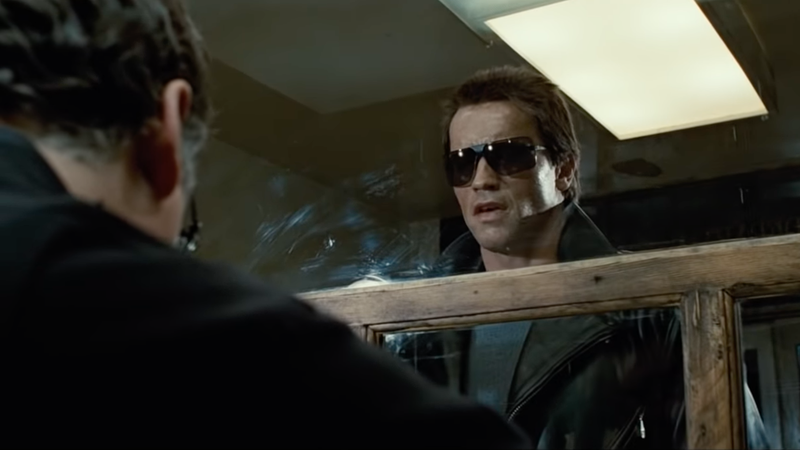
It’s strange to return to The Terminator after years of sequels that resemble it only in overarching narrative. The original is small, spare, unforgiving, and closer in spirit to creeping horror than shoot-’em-up action on the sliding genre scale. Set pieces, like the Terminator’s grisly rampage through an ill-equipped police station, inspire more pit-of-the-stomach dread than adrenaline rush. The nocturnal timeframe also enhances the supernatural terror of the material, as do gory shots of the villain performing surgery on himself. Even the fiery finale resembles the final scenes of a slasher movie more than the slam-bang climax of a Hollywood blockbuster. The film’s real special effect is its marquee star. Conan The Barbarian had already catapulted Arnold Schwarzenegger into the limelight, but it was The Terminator that made him an action hero. His take on the character isn’t robotic, exactly; he’s remorseless but not quite emotionless, judging from the occasional flare of volcanic, bestial anger. Cameron sees more of an alien quality in Schwarzenegger’s iron-thick accent, halting delivery, and impossible physique; he’s the mechanical man as hostile new species—and Schwarzenegger, draining his eccentric star persona of any warmth, has never been so frighteningly well-utilized. (In fact, the series as a whole has made marvelous use of the actor, finding menace, humor, and even poignancy in his superhuman otherness.) [A.A. Dowd]
We Need To Talk About Kevin
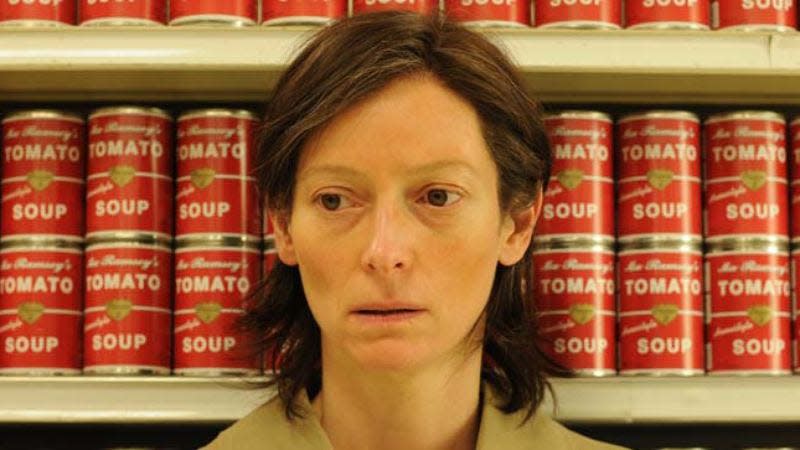
For her radical adaptation of Lionel Shriver’s book, director Lynne Ramsay (Morvern Callar) dispenses with the epistolary format altogether and attempts to access the mother’s troubled psyche without a breath of narration. And in its best sequences, Ramsay puts her duress in dazzlingly visual terms, collapsing the past and present in an associative rush of red-streaked images and piercingly vivid moments out of time. When the film finally settles, it eases into scenes of a zombiefied Swinton, post-massacre, trying to carry on with her son (Ezra Miller) in jail and her neighbors openly expressing their hostility. It also tracks the mother-and-son relationship from the beginning, as an unresponsive infant and toddler grows into a sullen, violent, frighteningly remote teenager—all while his oblivious father (John C. Reilly) looks away. [Scott Tobias]
The Wolf Of Wall Street
“This is obscene,” stammers Max Belfort (Rob Reiner) upon first glimpse of his son’s empire, the spacious Long Island office where Jordan Belfort (Leonardo DiCaprio) and his team of cold-calling brokers work and play. “Obscene,” as it turns out, is practically a polite euphemism for how these crooks live—for the lucrative swindle they pull on their clueless clients, and for the endless orgies of drugs and hookers that otherwise occupy their time. There’s a lot of sense in Martin Scorsese, our premier cinematic authority on American sin, bringing this real-life tale of greed and hedonism to the screen. But who could have predicted that he’d turn it into a flat-out comedy, one as boldly excessive as the lives it chronicles? [A.A. Dowd]
You Were Never Really Here
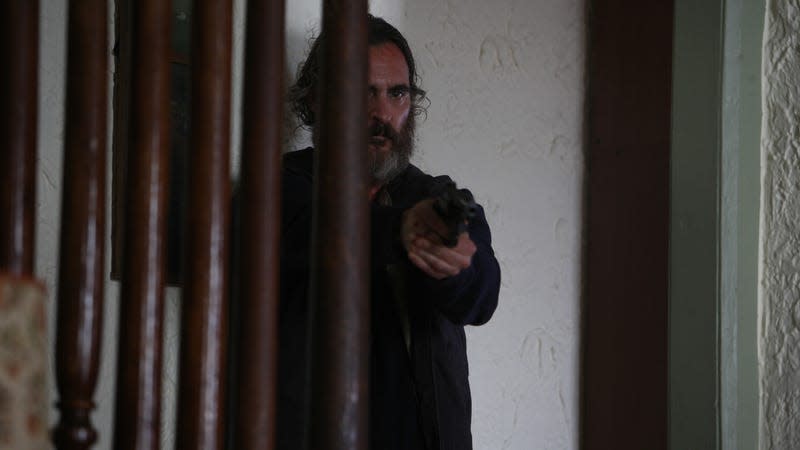
Director Lynne Ramsay’s latest dive into the deepest, most diabolical trenches of the human psyche is as fractured as the consciousness of its protagonist, the physically intimidating, psychologically fragile assassin-for-hire Joe (Joaquin Phoenix). Ramsay swings between understatement and excess with bravado, a destabilizing tactic that injects every loaded silence with a sense of palpable dread. The result is an impressionistic fugue state of a film that illuminates moments of unspeakable violence with the blinding indifference of a flashbulb, a series of Polaroid photographs stashed under a dirty, bloodstained mattress in a blighted Skid Row hotel room. But for all of its grim, broad-shouldered misanthropy, You Were Never Ready Here also finds time for moments of simple, unspoiled beauty—ephemeral, but beautiful nonetheless. [Katie Rife]
